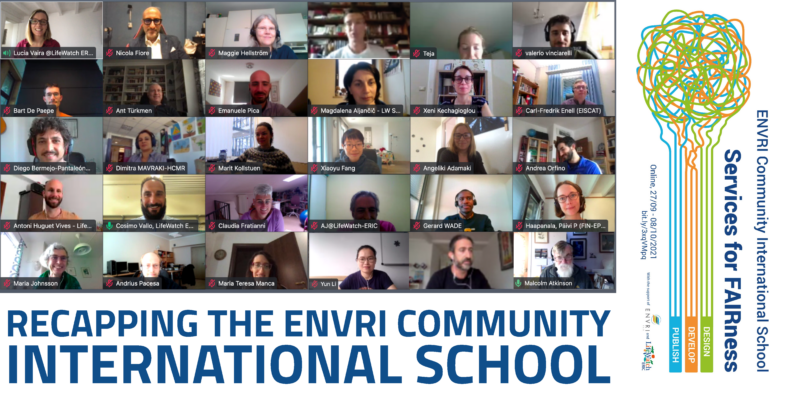
The ENVRI Community International School 2021 “Services for FAIRness”, organised by LifeWatch ERIC and ENVRI Community, was held online from 27 September – 8 October. Centred on the FAIR principles (Findability, Accessibility, Interoperability and Reusability), the School covered the design, development and publishing of FAIR webservices: the full programme can be found here. The initiative attracted 19 participants from all around the world, predominantly academics, policymakers and ICT experts, with 13 nations represented –from Italy, to Senegal, to Sweden– making it a truly international School, with a near 50:50 gender balance.
As well as the participants, the team of trainers and experts was also international, listed below in alphabetical order:
• Alessandro Spinuso – Data Technology Researcher at The Royal Netherlands Meteorological Institute
• Andreas Petzold – Head of Group Global Observation Forschungszentrum Jülich
• Antoni Huguet-Vives – Front-end architect for the LifeWatch ERIC ICT-Core team
• Antonio José Sáenz-Albanés – ICT Infrastructure Operations Coordinator at LifeWatch ERIC
• Luca Cervone – Executive Technologist at CREA-AA
• Malcom Atkinson – Professor of e-Science at Edinburgh University
• Nicola Fiore – ICT Coordinator of the LifeWatch ERIC Service Centre
• Oleg Mirzov – System Architect at ICOS Carbon Portal
• Rita Gomes – Software Engineer at Forschungszentrum Jülich
• Zhiming Zhao – Assistant Professor at the University of Amsterdam
The School included trainer-led sessions (24 hours), group work and self-study, for a total of 50 learning hours over a two-week period, with lessons taking place on Monday, Wednesday and Friday mornings. Participants appreciated the day-on–day-off approach, which allowed them time to process and elaborate the contents of the live sessions and read the provided study materials. On the last day, all the participants had the chance to show and share what that they learned during the School through group work presentations, in which they illustrated their respective projects to the rest of the class and the trainers.
So, the big question is: was the School useful? The statistics and the participants’ feedback speak for themselves: even though the participants’ prior knowledge of the topic varied widely, 80% of them self-evaluated strengthened skill levels in all three categories from the start to the end of the course – designing, developing and publishing FAIR data services. LifeWatch ERIC and the ENVRI Community are very pleased with the outcome of the School and look forward to future editions to continue enhancing the knowledge of FAIR principles, hoping in the meantime that the School can go back to in-person delivery!